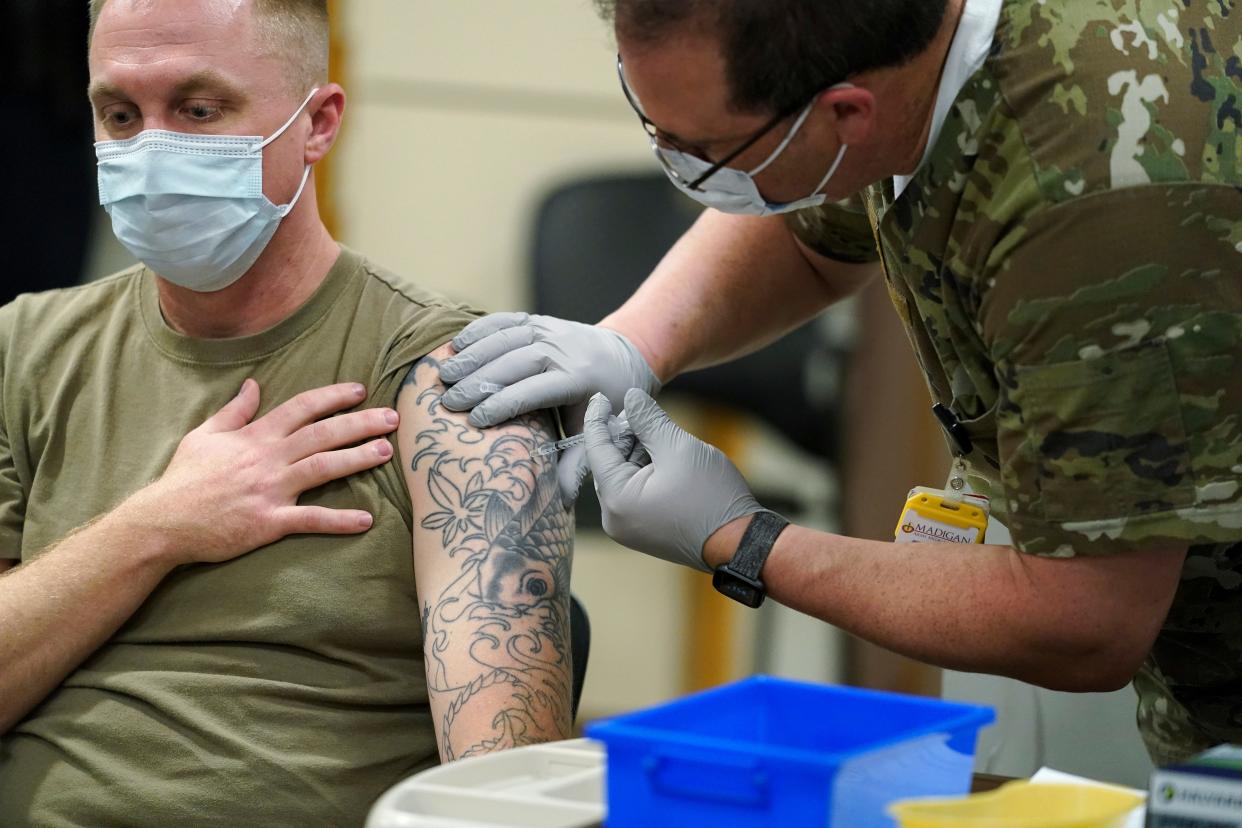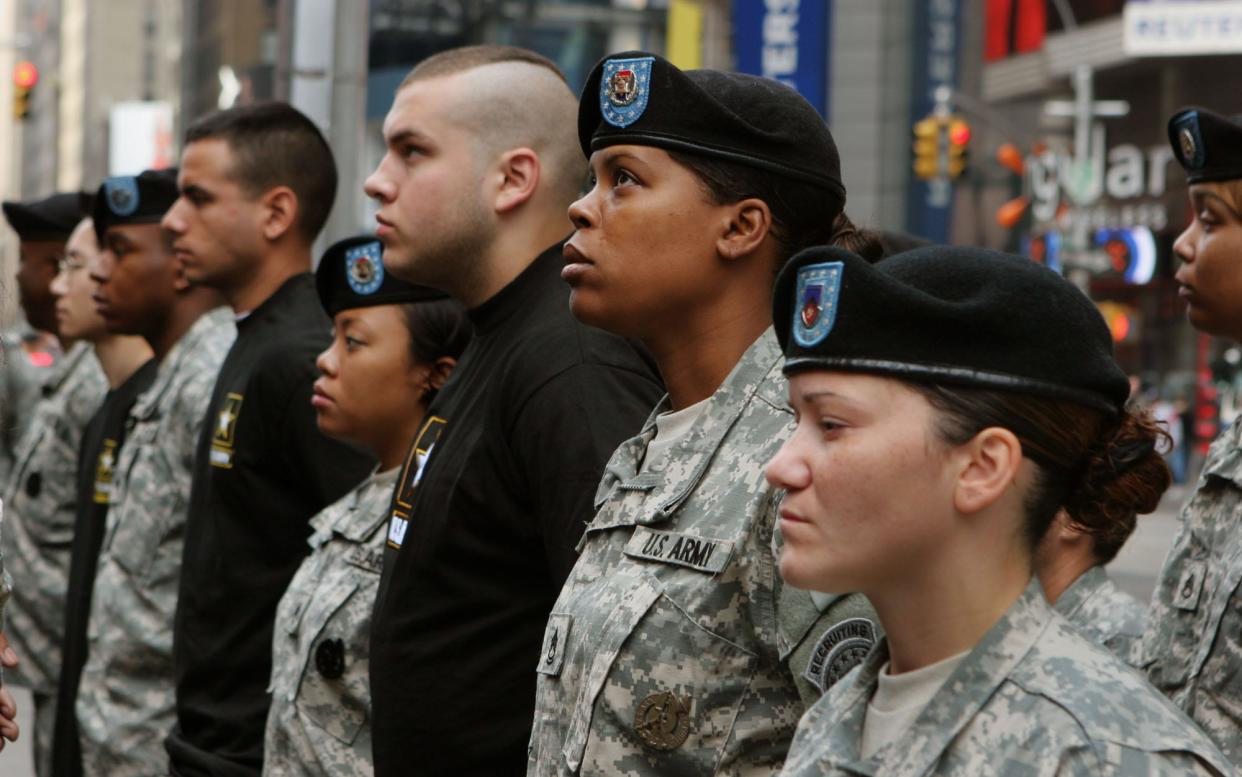Culture wars: House Republicans attack Defense Department for 'woke' social policies
WASHINGTON – House Republicans plan to open a new front in the culture wars: attacking the Pentagon for its “woke” social policies.
GOP leaders have won an early skirmish. Congress passed a defense bill that will no longer require service members to receive the COVID-19 vaccine – one of many military policies the soon-to-be Republican-led House may spotlight in the next Congress.
GOP members of military oversight committees in Congress are signaling they’ll target the Pentagon over racial curriculum at military academies, efforts to root out extremists from the ranks, and funding for troops’ abortions. The issue could get an increased focus in this Congress as Republican members, who will now control the House of Representatives and its committees, have more sway over the chamber’s agenda.
Smart analysis delivered to your inbox: Sign up for the OnPolitics newsletter
Pay raise, Ukraine aid, suicide prevention: Congress OKs $858 billion in Defense spending
“I’ve watched what the Democrats have done in many of these, especially in the NDAA [National Defense Authorization Act] and the ‘woke-ism’ that they want to bring in there,” Minority Leader Kevin McCarthy, R-Calif., who is in line to become Speaker of the House, said during a November press conference.
A 2022 survey conducted by the non-profit Reagan Foundation found 50% of respondents felt that so-called “woke” practices in some way undermined military effectiveness.
Defense Secretary Lloyd Austin has more urgent items on his agenda, said Sabrina Singh, the Pentagon’s deputy press secretary.
Austin, she said, “is focused on the priorities he set out at the beginning of this administration – defending the nation, deterring strategic attacks against the U.S., allies and partners, deterring aggression and building a lethal, resilient joint force – and we will continue to work with Congress in a bipartisan, bicameral way, just as we always do.”
Democratic Rep. Adam Smith of Washington, who chaired the House Armed Services Committee in the last Congress, said the discussion surrounding these social policies should be framed differently — with more of a focus on addressing bigotry and racism.
“The debate around this has really been idiotic trying to put this into a box of ‘woke’ or ‘not woke,’” he said.
The COVID mandate
Congress in December passed a version of the National Defense Authorization Act (NDAA), which directs Pentagon spending, that included a provision reversing the mandate that all troops are required to receive the COVID-19 vaccine. More than 3,700 Marines, 1,800 soldiers and 2,000 sailors have been discharged for refusing to get vaccinated, according to Pentagon data.
“There were a lot of service members who were wronged by this policy,” said Rep. Brian Mast, R-Fla., an Army veteran.
Mast sponsored legislation that would allow service members to return to duty at their same rank if they were dismissed because of refusal to obtain the COVID-19 vaccine.
Rep. Mike Gallagher, R-Wis., who served active duty in the United States Marine Corps, said the COVID-19 vaccine played a role in recruits’ willingness to join the military.
“I would submit that if 33% of 16- to 28-year-olds are not going to get the vaccine, that the vaccine mandate has to play a role there,” he said during a panel at the Reagan National Defense Forum last month, referencing recruitment numbers that are falling.
But a Pentagon survey of young people from January to September found the majority said the vaccine mandate did not change their likelihood of joining the military, according to the DOD’s Singh. Some of the respondents said the mandate increased their likelihood of signing up.
Rep. Chrissy Houlahan, D-Pa., a former air force officer who grew up in a military family, said she opposes revoking the COVID-19 vaccine mandate, but understands it was part of the negotiations needed to pass the defense bill.
Services members must meet many requirements for military readiness, one being vaccines, to maintain the health of the organization, she said.
“I worry about sort of a slippery slope of what it might mean for other similar requirements,” Houlahan said.
Other ‘woke’ policies
Critical race theory
Some Republicans highlight what they say is the teaching of critical race theory at service academies. Critical race theory is an academic framework that examines how racism permeates institutions.
Rep. Michael Waltz, R-Fla., a member of the Armed Services Committee, said he had received complaints from the family of a cadet at West Point incensed by a course titled “understanding your whiteness and white rage.” Waltz, an Army National Guard colonel and Green Beret, called the course “incredibly divisive” and said it “had no place in the military.”
West Point said it has never offered such a course.
“There is no course at West Point on ‘Understanding your Whiteness’ nor any professor who teaches that the Republican party is a party of white supremacy,” West Point’s public affairs office said in a statement.
But Smith, the Washington congressman, said students may encounter critical race theory and lessons on Communism and Marxism. These are theories that are present in the world and impact how service members do their job and deal with society.
“It’s education,” he said.
Abortion
Abortion policy is likely to become another battleground. A Pentagon policy under development would cover troops’ travel expenses to obtain an abortion if they serve in a state that doesn’t provide them, said Army Maj. Charlie Dietz, a Pentagon spokesman. It would also provide them with time off.
The proposal followed the Supreme Court’s overturning of Roe v. Wade, eliminating the federal guarantee to abortion access. The proposed policy is unlikely to withstand legal challenges, Waltz said.
Smith said he believes the policy “makes a great deal of sense.”
“Women should have the right to access the healthcare that they need,” he said. “I certainly think that it is going to be an impediment to recruiting the service members we need if they know they go into the military and serve, they’re going to not get this healthcare.”
Extremism
Among Austin’s first acts as Defense chief was to order a review of extremism among troops. A month after the Jan. 6 insurrection, Austin directed commanders to take a day to stress “the importance of our oath of office; a description of impermissible behaviors; and procedures for reporting suspected, or actual, extremist behaviors.”
“That was his top concern, and he testified about the rising tide of white extremism within the military,” Waltz said.
The Pentagon’s own data show that the concern may have been overblown, Waltz said. There are more than 2 million active-duty and reserve troops in the military. The Pentagon’s review found 211 allegations of extremist behavior that resulted in 183 referrals, investigations, and inquiries, according to the Pentagon Inspector General. Of those, there were 48 instances in which troops were subject to some type of action, and 46 cases resulted in no action. There were 112 referrals to civilian law enforcement agencies.
That data does not fit the narrative that there is an issue with extremism within the military, Waltz said. Yet Pentagon leaders maintain “hyper focus” on diversity, equity and inclusion, a stance that may hurt recruiting, he said.
Why are ‘woke’ issues important to Republicans?
Gallagher said the issue of “wokeness” resonates with Republicans.
It’s fair to criticize diversity, equity and inclusion (DEI) initiatives, Gallagher said during the Reagan National Defense Forum. They add another layer of bureaucracy to an institution that is already heavily bureaucratic he said.
Republicans are concerned that DEI programs have no impact or are actively counterproductive and increase friction within forces, Gallagher said.
The Pentagon’s focus on cultural issues distracts from its primary purpose of “winning our nation’s wars,” Waltz said. He cited threats from China, Russia, Iran, and North Korea as well as global terrorism as more important priorities.
Rep. Mast added that these cultural policies are “a very big deal” for recruits and their parents.
“These are very literally subjects and questions that have come up in very crowded meetings that I’ve had with groups of parents, Mast said. The issue is a ”very big deal, people are paying attention to it.”
But to some Democrats, this entire focus on “woke” issues is simply about Republicans wanting to create a “caricature” of Democrats while acting like racism and bigotry aren’t worth addressing.
“Republicans simply want to use it as a political piñata for their own personal political advancement and to trash Biden and the U.S. military because it’s politically convenient for them as opposed to seriously looking at how we balance these questions of race and gender,” Smith said.
This article originally appeared on USA TODAY: Culture wars: House republicans attack Pentagon for ‘woke’ policies
Source: Read Full Article



